The National Emergency Commission (CNE) has declared a green weather alert across Costa Rica due to the expected increase in rainfall over the coming days. According to the CNE, the alert has been issued based on forecasts through Monday.
Meteorologists explain that the presence of an upper-level trough (an elongated area of low atmospheric pressure in the upper atmosphere), combined with a more active Intertropical Convergence Zone (ITCZ), will bring an increase in rainfall.
Unlike a tropical wave, which always carries significant moisture and typically travels westward across Central America, a trough does not always generate rain throughout the country. Instead, it tends to enhance rainy conditions when it coincides with other atmospheric factors.
The National Meteorological Institute (IMN) reported that the passage of this trough over the Caribbean Sea will favor greater cloud development and more intense rainfall. A gradual increase in showers and storms is expected nationwide between Friday and Monday.
“The ITCZ together with a trough at high levels of the atmosphere and high humidity, are creating conditions conducive to the development of showers and thunderstorms,” reported the IMN.
Currently, these factors are causing cloud cover and storms in maritime areas near the country’s coasts, as well as localized rainfall on the Central Pacific and South Pacific coasts and in northern Guanacaste.
CNE president Alejandro Picado reminded the public “we are in the middle of the rainy season, entering the months that historically produce the heaviest rains” and emergencies tend to be more common.
The CNE urged communities in flood- and landslide-prone areas to remain alert and reinforce prevention measures. “We urge the population to stay informed through official channels and to monitor conditions during heavy rains, especially in high-risk areas,” pointed out Alejandro Picado.
Meanwhile, a Saharan dust plume will cross the central Caribbean Sea and parts of northern Central America this weekend. Costa Rica has experienced eight episodes of Saharan dust so far in 2025, more than in recent years, according to the IMN.
“Some of these events have lasted several days, with high particle concentrations,” explained Daniel Poleo of the IMN.
In case of emergency, residents are advised to call 9-1-1.






